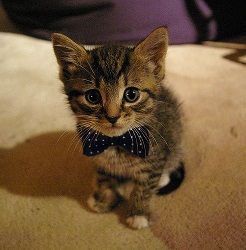In order to hold your audience's interest, you have to get their interest in the first place. That's why you start with the hook.
A hook is a statement that catches your audience's attention, and also clues them in to what's coming up in the story. Let me illustrate with a story that shows how powerful hooks can be (and yes, I just used a hook on you!)
Years ago, psychologists ran an experiment. They asked people to read the following paragraphs:
“The procedure is actually quite simple. First you arrange things into different groups. Of course, one pile may be sufficient depending on how much there is to do. If you have to go somewhere else due to lack of facilities that is the next step, otherwise you are pretty well set. It is important not to overdo things. That is, it is better to do too few things at once than too many. In the short run this may not seem important but complications can easily arise. A mistake can be expensive as well. At first the whole procedure will seem complicated.
Soon, however, it will become just another facet of life. It is difficult to foresee any end to the necessity for this task in the immediate future, but then one never can tell, After the procedure is completed one arranges the materials into different groups again. Then they can be put into their appropriate places. Eventually they will be used once more and the whole cycle will then have to be repeated. However, that is part of life.”
If you're scratching your head after reading this paragraph, you're not alone – the study participants thought it was goobleygook.
Or well, most of them did. One group of participants was told “You're about to read some instructions for doing laundry.” For those participants, it was a snap to follow along with the paragraphs (and indeed, if you re-read it now, you'll probably understand what you're hearing much better.)
What does this have to do with storytelling? Simple. If you launch right into a story without giving some context, then people won't know what to do with the details you're giving them. It's kind of like giving someone driving directions before they know the starting address. But if you help them understand what your story is about before it beings, they will follow along with no problem.
So offer a hook. Begin a story with something like “That reminds me of my worst date ever” or “Did I ever tell you about the time I went on a date with a professional wrestler?” Give people a sense of what the story is about so they don't get lost. This is especially important for longer stories – if your story is only a few sentences long a hook may not be necessary, but if you're asking people to pay attention to you for 30 seconds or more, you'd better give them a hook.
The other benefit of the hook – if your audience doesn't “bite”, then you know not to bore them with the story. If you share a hook and nobody seems interested, you may want to consider telling an abbreviated version of the story, or sharing a different story instead.

